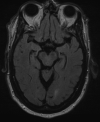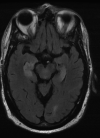Atypical presentation of an elderly male with autoimmune encephalitis: anti-LG1 limbic encephalitis
- PMID: 32850103
- PMCID: PMC7427439
- DOI: 10.1080/20009666.2020.1785160
Atypical presentation of an elderly male with autoimmune encephalitis: anti-LG1 limbic encephalitis
Abstract
Introduction: We present a case of an elderly male with anti-LG1 limbic encephalitis involving hypothalamus presenting with acute changes in mental status and persistent hyperthermia.
Case report: A 74-year-old male presented to the hospital with fever and chills. He had also been evaluated by his PCP for changes in his mental status, trouble remembering things, and following directions while driving. A lumbar puncture was performed, and empiric meningitis coverage was initiated. His LP results were not suggestive for any infectious process. An MRI showed bilateral hippocampal edema. As an infectious workup was non-revealing and other causes were ruled out, with the concern for paraneoplastic or autoimmune encephalitis, patient was started on high dose steroids and plasma exchange while results of antibodies for autoimmune and paraneoplastic encephalitis were awaited. After plasmapheresis and a course of steroids, the patient's mental status began to slowly improve. He was discharged from the hospital and on subsequent neurology office visit, his serum autoimmune encephalitis panel returned positive for anti-LGI 1 antibodies. Further management consisted of outpatient rituximab infusion.
Discussion: Diagnosis of limbic encephalitis can be challenging and can present with symptoms of limbic dysfunction. A modest index of suspicion of limbic encephalitis should be kept in adults with altered mental changes. Early recognition and initiation of therapy can be crucial in the management of patients with autoimmune encephalitis and can prevent permanent cognitive impairment and damage.
Keywords: Limbic encephalitis; anti-LG1 encephalitis; autoimmune encephalitis.
© 2020 The Author(s). Published by Informa UK Limited, trading as Taylor & Francis Group on behalf of Greater Baltimore Medical Center.
Conflict of interest statement
The authors report no conflicts of interest.
Figures
References
-
- Bhardwaj K, Sharma SK, Pandey AK, et al. A case of limbic encephalitis: antibody LGI1 associated encephalitis. J Neurol Neurosci. 2016;7:4.
-
- Machado S, Pinto AN, Irani SR.. What should you know about limbic encephalitis? Arq Neuropsiquiatr. 2012;70:817–822. - PubMed
Publication types
LinkOut - more resources
Full Text Sources
Research Materials


